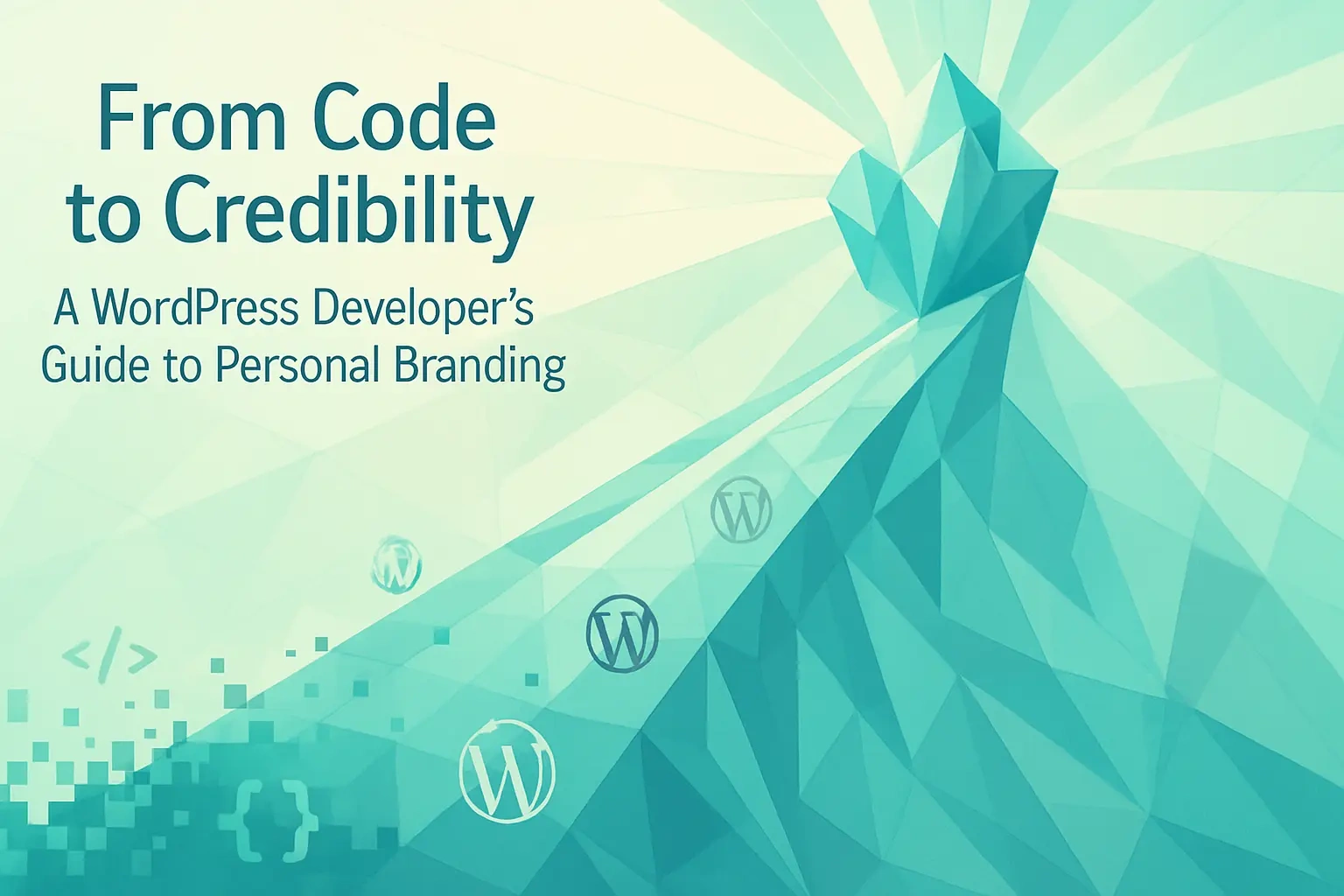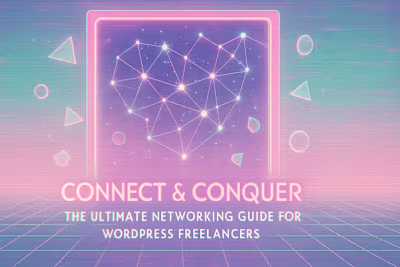From Code to Credibility: A WordPress Developer's Guide to Personal Branding

From Code to Credibility: A WordPress Developer's Guide to Personal Branding
Finding Your Niche: The Foundation of Your Brand
Why Specialization Matters
Identifying Your Unique Strengths
Building Your Online Presence
Your Website: The Hub of Your Brand
Strategic Social Media Presence
The Power of a Professional Bio and Headshot
Content Marketing for Brand Building
Blogging About Problems You Solve
Creating Tutorials and How-To Guides
Sharing Your Knowledge on Other Platforms
References
From Code to Credibility: A WordPress Developer's Guide to Personal Branding
In a crowded marketplace, your technical skills are only half the battle. A strong personal brand is what makes you memorable, trusted, and sought-after. Your brand is your reputation, and it's showcased through compelling case studies in your portfolio and amplified by your professional network. This guide will help you define and build a personal brand that allows you to attract the clients you want to work with and find expert WordPress developers to collaborate with.
Think about the last time you hired someone. Did you choose them purely based on their technical abilities? Probably not. You likely considered their communication style, their past work, and whether they seemed trustworthy. That's personal branding in action.
Finding Your Niche: The Foundation of Your Brand
Before you can build a brand, you need to know who you're building it for. This section covers the importance of specialization in the WordPress ecosystem.
Why Specialization Matters
Here's a hard truth: being a "WordPress developer who does everything" makes you invisible. When everyone claims to do everything, no one stands out for anything specific. Clients don't search for generalists. They search for solutions to specific problems.
Consider the difference between these two developer profiles. Developer A says "I build WordPress websites." Developer B says "I optimize WooCommerce stores to handle 10,000+ daily transactions without breaking a sweat." Who would an enterprise e-commerce company call?
The WordPress ecosystem is massive. You could specialize in WooCommerce development, focusing on complex product configurations and payment integrations. Maybe performance optimization is your thing, where you turn sluggish sites into speed demons. Security could be your niche, protecting businesses from the latest threats. Or perhaps you're a wizard with specific page builders like Elementor or Divi.
Each specialization opens doors to different client types. WooCommerce experts attract online retailers. Performance specialists appeal to high-traffic publishers. Security experts draw clients who've been hacked or want prevention. The key is choosing a niche that matches both market demand and your interests.
Identifying Your Unique Strengths
Finding your niche starts with honest self-reflection. What WordPress projects make you lose track of time? Which client problems do you solve effortlessly while others struggle? Your sweet spot lies where your skills, passion, and market demand intersect.
Start by listing your last ten projects. What patterns emerge? Maybe you've built several membership sites without realizing it. Perhaps clients keep coming back for your custom plugin development. These patterns reveal your natural strengths.
Next, consider what energizes you. Do you love the puzzle of making sites lightning-fast? Does creating beautiful, accessible designs make you proud? Or do you get excited about complex database queries and API integrations? Your enthusiasm shows in your work quality.
Don't forget to validate market demand. Search job boards for your potential specialization. Check freelance platforms for project volume and rates. Join WordPress communities and notice which problems people discuss most. A great niche combines your strengths with real client needs.
Finally, test your niche with a simple exercise. Write three blog post titles about problems you'd solve in your specialty. If ideas flow easily, you're on the right track. If you struggle, keep exploring.
Building Your Online Presence
Your online presence is the tangible expression of your brand. This section will cover the essential platforms and how to maintain a consistent and professional image across them.
Your Website: The Hub of Your Brand
Your website isn't just another project. It's your most important case study. Every potential client will judge your abilities by how well you've built your own digital home. A slow, outdated, or poorly designed site screams "don't hire me" louder than any testimonial could praise you.
Start with performance. Your site should load in under three seconds, preferably two. Use tools like GTmetrix or PageSpeed Insights to benchmark and improve. Implement caching, optimize images, and choose quality hosting. Speed isn't just good practice; it shows you care about user experience.
Design matters too, but not in the way you might think. Your site doesn't need to win design awards. It needs to clearly communicate who you help and how. Within five seconds, visitors should understand your specialty and value proposition. Use clear headlines, not clever ones.
Structure your content around client needs, not your resume. Instead of listing skills, show how you solve problems. Replace "10 years of WordPress experience" with "I help SaaS companies reduce support tickets by 40% through intuitive WordPress dashboards." Make it about them, not you.
Include clear calls-to-action throughout. Don't make visitors hunt for how to hire you. Place contact options strategically, but don't be pushy. A well-placed "Let's discuss your project" button beats ten "HIRE ME NOW" popups.
Strategic Social Media Presence
Social media for developers isn't about being everywhere. It's about being effective where your clients and peers gather. Quality beats quantity every time.
LinkedIn is non-negotiable for professional presence. Optimize your profile with keywords related to your niche. Share insights about WordPress development, comment thoughtfully on industry posts, and connect with potential clients and collaborators. Post consistently, even if it's just once a week.
Twitter (now X) remains valuable for WordPress community engagement. Follow core contributors, plugin developers, and hosting companies. Share quick tips, retweet valuable resources, and join conversations using hashtags like #WordPress and #WebDev. Build relationships, not just follower counts.
GitHub showcases your code quality and collaboration skills. Contribute to open-source WordPress projects, maintain your own plugins or themes, and keep your repositories well-documented. Potential clients and employers often check GitHub to assess technical abilities.
Choose one or two additional platforms based on your niche. Instagram works well for designers showing visual work. YouTube suits developers creating tutorials. Dev.to or Hashnode can host your technical writing. Pick platforms you'll actually use consistently.
Maintain brand consistency across all platforms. Use the same profile photo, similar bios, and consistent color schemes. Your brand should be recognizable whether someone finds you on LinkedIn or Twitter.
The Power of a Professional Bio and Headshot
Your bio and headshot might seem like small details, but they're often the first impression you make. A professional headshot builds trust instantly. It doesn't need to be expensive. Good lighting, a clean background, and a genuine smile matter more than professional equipment.
Your bio should be a mini-pitch, not a life story. Lead with what you do for clients, not your credentials. "I help e-commerce brands double their conversion rates through optimized WooCommerce experiences" beats "Experienced WordPress developer with multiple certifications."
Write different bio versions for different contexts. Your LinkedIn bio can be longer and more detailed. Twitter needs punchy and personality-driven. Your website bio should be comprehensive but scannable. Each version should feel authentic while fitting the platform's culture.
Include specific achievements when possible. "Reduced client's page load time by 73%" is more compelling than "Performance optimization expert." Numbers build credibility. If you lack metrics, use specific examples: "Built custom booking system handling 1,000+ daily reservations."
Update your bio regularly. As you complete notable projects or gain new skills, refresh your bio to reflect growth. Stale bios suggest stale skills. Keep it current, relevant, and focused on how you help clients succeed.
Content Marketing for Brand Building
Creating valuable content is one of the most effective ways to demonstrate expertise and build authority. This section will provide actionable content strategies for busy freelancers.
Blogging About Problems You Solve
Every client question is a blog post opportunity. When a client asks "How do I speed up my WooCommerce checkout?" don't just answer them. Write a detailed post about it. You'll help countless others while showcasing your expertise.
Start with the problems you solve most often. These recurring issues are gold for content creation. If you're constantly fixing broken WordPress updates, write about preventing update disasters. If clients struggle with plugin conflicts, create a troubleshooting guide.
Structure your posts for busy readers. Use clear headings, short paragraphs, and bullet points. Include code snippets when relevant, but explain them in plain English. Screenshots and diagrams clarify complex concepts better than walls of text.
Optimize for search without sacrificing readability. Research keywords, but write for humans first. "How to Fix WordPress White Screen of Death" beats "WordPress WSOD Error Resolution Methodology." Use terms your clients actually search for.
Consistency trumps perfection. Publishing one good post monthly beats writing ten posts once a year. Set a realistic schedule and stick to it. Your audience learns to expect and look forward to your content.
Creating Tutorials and How-To Guides
Tutorials position you as a helpful expert, not a salesperson. They demonstrate your knowledge while providing immediate value. Plus, they're highly shareable, extending your reach organically.
Video tutorials work especially well for visual tasks. Show how to configure a complex plugin, optimize database queries, or customize theme files. Keep videos focused on one specific task. "How to Add Custom Fields to WooCommerce Products" beats "Complete WooCommerce Tutorial."
Written tutorials suit code-heavy topics. Include complete code examples, explain each section, and provide downloadable files when possible. Test everything before publishing. Nothing damages credibility faster than tutorials that don't work.
Choose tutorial topics strategically. Focus on tasks within your niche that clients find challenging. If you specialize in membership sites, create tutorials about restricting content, managing subscriptions, or integrating payment gateways.
Make tutorials actionable and specific. Instead of "Improve WordPress Security," write "How to Implement Two-Factor Authentication in WordPress in 10 Minutes." Specific promises attract more attention and deliver clearer value.
Sharing Your Knowledge on Other Platforms
Your own blog is important, but borrowing authority from established platforms amplifies your reach. Guest posting on popular WordPress blogs exposes you to new audiences while building backlinks to your site.
Target publications your ideal clients read. WP Tavern, Smashing Magazine, and SitePoint reach different audiences. Research their content guidelines and pitch topics that fit their style while showcasing your expertise.
Podcasts offer another avenue for sharing knowledge. Many WordPress podcasts seek expert guests. Prepare talking points about your niche, interesting client projects, or industry trends. Being a good guest means providing value, not just promoting yourself.
Participate in online WordPress events and webinars. WordCamps moved online during the pandemic and many continue virtual components. Speaking at these events builds authority and connections simultaneously. Start with lightning talks if full sessions feel daunting.
Answer questions in WordPress communities thoughtfully. Stack Overflow, WordPress.org forums, and Reddit's WordPress communities need expert answers. Provide helpful solutions without being promotional. Your expertise speaks for itself.
Building a personal brand as a WordPress developer isn't about becoming internet famous. It's about becoming known, liked, and trusted by the right people. Your brand is built through consistent actions: the quality of your work, the value of your content, and the professionalism of your presence.
Start small but start today. Choose one element from this guide and implement it this week. Maybe it's writing your first niche-focused blog post. Perhaps it's updating your LinkedIn profile to reflect your specialization. Or it could be reaching out to a podcast about being a guest.
Remember, your personal brand is a marathon, not a sprint. Every tutorial you create, every insightful comment you share, and every client you delight adds another brick to your credibility. Over time, these small actions compound into a reputation that attracts ideal clients and opens new opportunities.
The WordPress ecosystem rewards those who contribute and share knowledge. By building your personal brand authentically and consistently, you're not just advancing your career. You're making the WordPress community stronger for everyone.
References
Like this project
Posted Jul 6, 2025
Don't just be another WordPress developer. Learn how to build a powerful personal brand that attracts high-value clients and establishes you as a go-to expert.










